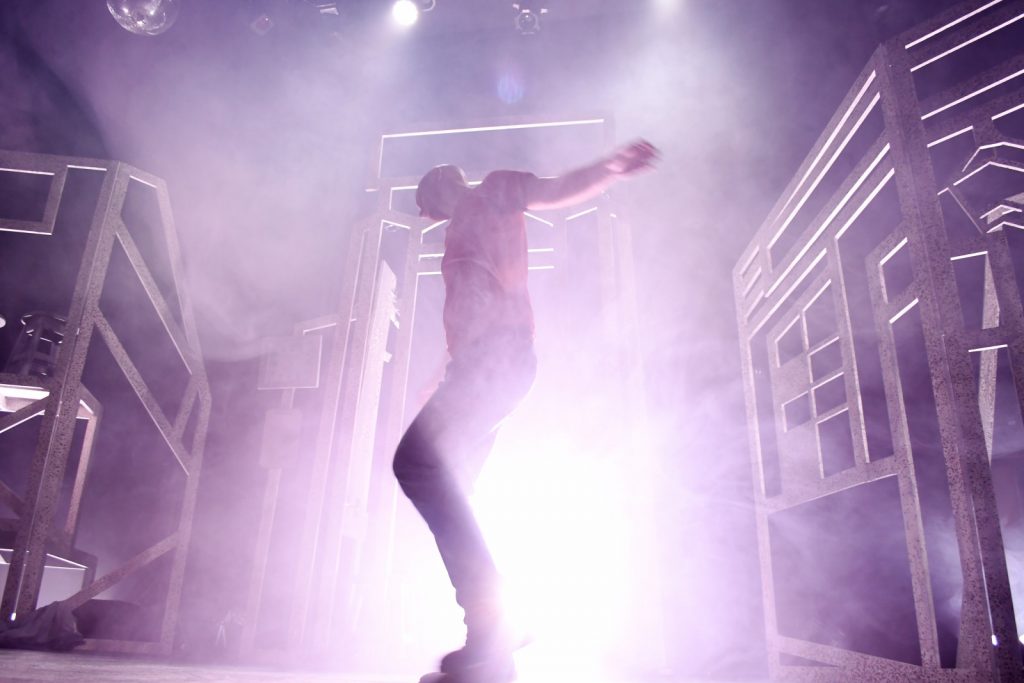‘The switchboard was the LGBTQ+ helpline of the 80s’ and is the starting point of the difficult subject matter told by the production of Cruise. (Image Odette Putzier)
Jack Holden’s Cruise, the first play to surface from the Covid pandemic in London, has arrived on South African shores for a brief, year-end run in Joburg. This gargantuan task of taking on this one-man show is effortlessly assumed by local actor, director, musician and composer Daniel Geddes in a 90-minute ode to the many lost to Aids and a celebration of life for those who made it through.
Cruise is the true story of what should have been Michael Spencer’s last night on earth, following his HIV diagnosis in 1984. He is told he has but four years left to live so, with the clock ticking, he and partner Dave sell all and party up a storm in their end times.
Geddes’s performance is the stuff of a master storyteller. Drawing you in from the very first line, he effortlessly delivers raunchy, yet socially relevant, commentary that remains true to queer culture, without pandering to the usual stereotypes. It is an unashamed telling of a story that, in some, will spark memories while, in others, might share an insight for the first time. Gems like “the switchboard was the LGBTQ+ helpline of the 80s” and “doorways leading to X-rated Narnias” underpin a well-researched script that hones in on the exuberance and innocence of 1980s Soho, Old Compton Street in particular.
The South African production is directed by Josh Lindberg, with original music by Roelof Colyn, set design by Wilhelm Disbergen, lighting by Jane Gosnell and produced by Colin Law. Lindberg reflected, “This play is perfectly relevant here in South Africa, within our current time. Now, more than ever (somewhat sadly), our world still has so much further to travel in terms of acceptance of all. To ‘live every day like it is your last, in the present’. This story can be related to individual stories and can find a home with each of us.”
Bringing the piece to life, Geddes moves effortlessly from one character to the next with changes in accent and posture.
“I started by understanding what each character would feel and experience, then I determined what their voice would sound like. In this way, I built up each from the outside in, being mindful not to impose these characterisations on their individual truths, their stories.”
In so doing, Geddes has been careful not to make caricatures of the people who give vital life and substance to the piece.
 | Michael lives out his last night on earth in an immersive sensory experience based in 1980s Soho. (Image Odette Putzier)
| Michael lives out his last night on earth in an immersive sensory experience based in 1980s Soho. (Image Odette Putzier)
Spending time with Geddes after his performance on Wednesday evening, he shared it was the writing, with its nuanced and often poetic feel, that drew him to the production. This appreciation comes through in his performance which he has successfully made his own. He credits this to director Lindberg’s vision to see the production live off the page as a text, rather than as a copy-paste of a piece performed in London’s West End.
As the play makes its way to its conclusion, I am struck by the innocence of the character of Michael. His 90-minute verbal assault against the then-unfolding effects of a pandemic that will change his life on every level is laced with an optimistic innocence I strongly relate to. Yet, at the heart of this innocence, is a sense of honest realism. At one point Michael shares, “I thought about calling my mom, but I would have been a stranger telling her that an even stranger stranger had passed.”
Cruise brilliantly shares the long way we have come in queer culture but, sadly, I feel there is still much ground to be covered.
If there’s one thing you do between now and Sunday, it should be taking in this play.
The show runs at The Theatre Linden until Sunday, 11 December, with tickets priced at R200 and discounts available for pensioners and students. Bookings online via Quicket.